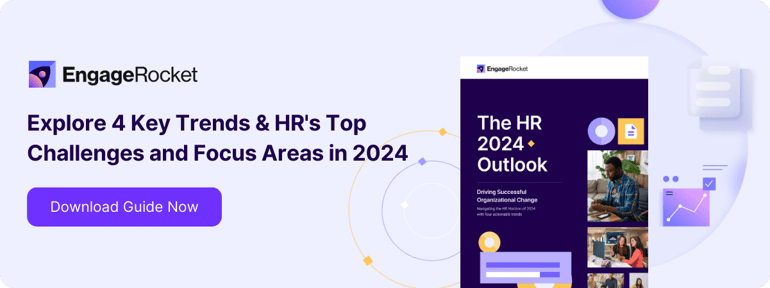As we navigate through rapid organizational change, the spotlight on employee engagement trends in 2024 intensifies, as noted in our HR Outlook 2024.
The previous few quarters have seen a spate of disengagement among global workforces, manifesting in trends like The Great Resignation and Quiet Quitting.
These insights into employee engagement signal a pivotal moment for HR professionals and organizational leaders alike, pushing the boundaries of traditional engagement strategies into more dynamic, responsive approaches.
The Role of Leadership in Fostering Engagement
Team leaders, middle managers, and executives play a crucial role in nurturing employee engagement—a sentiment echoed across various studies and reports highlighting HR challenges in 2024.
Given that direct managers often hold greater trust from employees, their involvement becomes indispensable. Trust, a cornerstone of workplace harmony, significantly influences an employee's sense of belonging and engagement. Mobilizing these trusted figures is therefore essential in cultivating a conducive environment for engagement.
“Employee engagement is a collective responsibility. Leaders at different levels should actively participate in fostering engagement within their teams. At CAG, leaders take charge of engagement initiatives, utilizing feedback from surveys and focus groups to identify key areas of focus. Shared ownership guarantees that engagement is not solely an HR-driven effort but a commitment embedded at all levels of the organization."
— Justina Tan, Executive Vice President of Corporate, People and Culture at Changi Airport Group
Overcoming Managerial Hesitation
However, it's important to note that some managers may initially express reservations about the tangible benefits of enhancing employee engagement.
Concerns often revolve around the additional workload with no immediate, visible payoff. Yet, as HR Trends 2024 suggests, engaging managers in employee engagement initiatives emerges as a critical endeavor for HR departments.
Key Insights to Remember
Trust and Managerial Influence
-
84% of employees trust their managers, a statistic from EngageRocket's research, underscoring the pivotal role of trusted leaders and managers in effective employee engagement strategies.
Trust and Managerial Influence
-
70% of the variance in employee engagement is attributable to managerial actions. This highlights not only the impact on individual employees but also collective team dynamics and performance.
The Need for Supporting Managers
-
Only 20% of managers feel supported by their organizations in succeeding as effective leaders. This gap presents a substantial opportunity for HR to enhance support through training, process redesign, and the implementation of empowering tools.
Strategic Employee Engagement Integration Using People Analytics
-
70% of companies leveraging workforce analytics gain a superior understanding of their talent needs compared to those who don't, emphasizing the value of data-driven insights in driving employee engagement.
2024 Priorities Checklist
1. Demonstrating the impact of engagement on the bottom line:
Quantifying the outcomes of employee engagement initiatives is crucial for securing buy-in from organizational leaders. This aspect of HR challenges 2024 involves illustrating how engagement directly influences profitability, sales, and customer experience.
Through workforce analytics, HR can showcase the tangible benefits of employee engagement and experience on various bottom-line metrics.
2. Advocating for granular ownership of employee engagement:
Ownership over engagement tasks—conducting and analyzing surveys, regular conversations, decision-making adjustments, and program implementations—should be distributed among managers and team leaders.
This approach allows for a deeper understanding of the unique engagement needs of each team and individual, promoting a more personalized engagement strategy.
“At WebMD, we structure employee engagement ownership across two key levels. On the company-wide level, our engagement initiatives are broad, encompassing activities like donations, concerts, and awards organized by our dedicated committees. My role as Head of People involves leading the charge in evaluating employee feedback and guiding executives to take ownership of specific aspects based on their departmental needs. On the business unit level, engagement is tailored to each vertical, with leaders and teams creating an environment that resonates with their unique goals and culture."
— Andrea Herron, Head of People, HRBP/Strategic Operations at WebMD
3. Avoiding the silver bullet perception of engagement initiatives:
It's essential to manage expectations regarding the immediate impact of engagement programs. These initiatives require time, trial and error, and continuous support from HR to foster enduring change.
Providing managers with the necessary training and tools for ongoing engagement conversations is pivotal.
4. Implementing a data-driven approach:
A data-driven strategy for employee engagement conserves time, effort, and resources, facilitating the selection and implementation of effective programs. Data from pulse surveys, focus groups, exit interviews, and similar sources should be thoroughly analyzed to inform engagement strategies.
Establishing a clear correlation between engagement data collection, organizational actions, and business outcomes is key to sustaining this virtuous cycle.
Conclusion
Towards a collective responsibility: Shaping the future of employee engagement in 2024
As we delve into the HR trends 2024 and insights into employee engagement, it becomes clear that a multifaceted approach is required to address the evolving landscape of work dynamics. The role of trusted managers, underpinned by a robust, data-driven framework, stands out as a critical element in the quest to enhance employee engagement.
By embracing these challenges and opportunities, HR professionals can lead the way in fostering environments where engagement flourishes, driving organizational success in the process.
“Our values to care for mankind remain constant and unchanging, embodying a heritage that holds as much relevance today as it did for over 140 years. At Eu Yan Sang, employee engagement goes beyond being a mere buzzword but is vital to both individual and organizational success"
— Ng Lip Gee, General Manager, Group Human Resources at Eu Yan Sang
💡 Read the full highlights or trends and recommendations for the year ahead in the HR 2024 Outlook below:







 .
. 